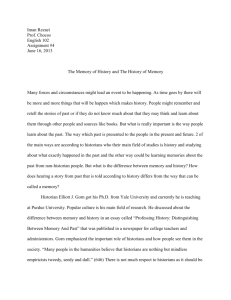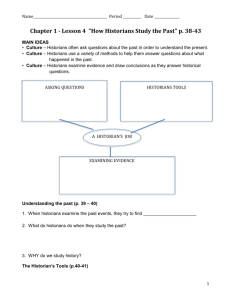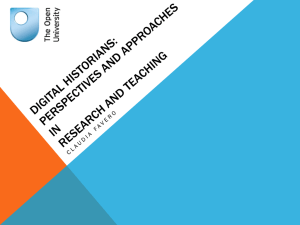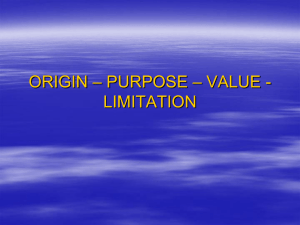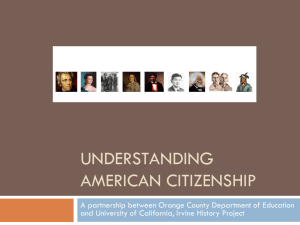The Fundamentals of History
advertisement
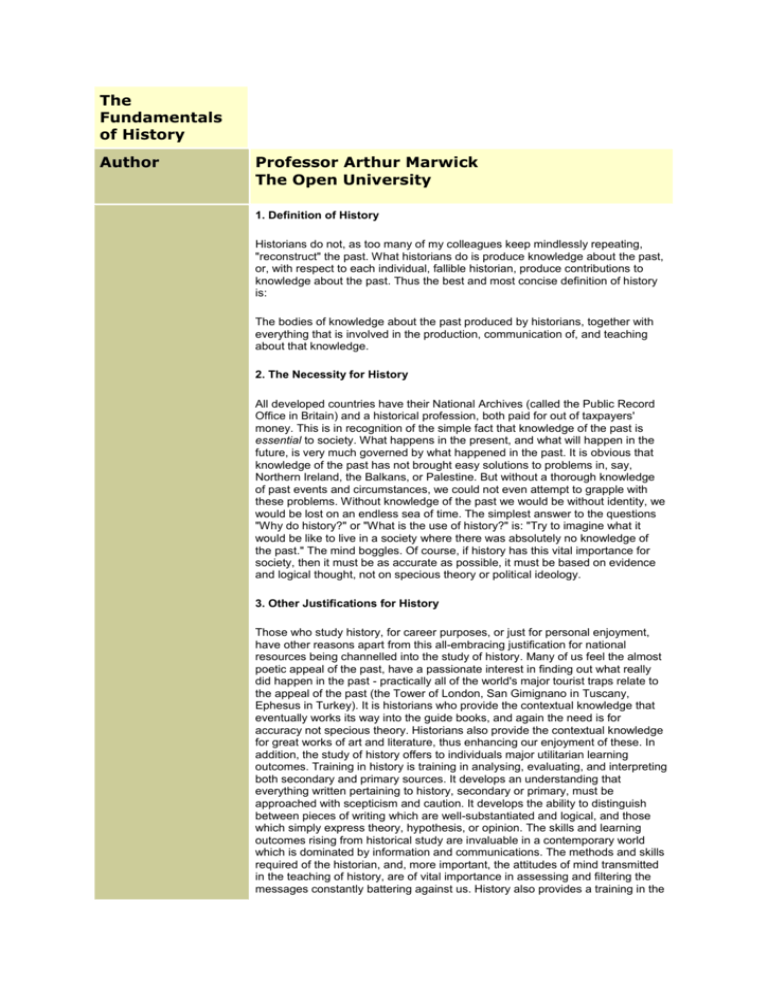
The Fundamentals of History Author Professor Arthur Marwick The Open University 1. Definition of History Historians do not, as too many of my colleagues keep mindlessly repeating, "reconstruct" the past. What historians do is produce knowledge about the past, or, with respect to each individual, fallible historian, produce contributions to knowledge about the past. Thus the best and most concise definition of history is: The bodies of knowledge about the past produced by historians, together with everything that is involved in the production, communication of, and teaching about that knowledge. 2. The Necessity for History All developed countries have their National Archives (called the Public Record Office in Britain) and a historical profession, both paid for out of taxpayers' money. This is in recognition of the simple fact that knowledge of the past is essential to society. What happens in the present, and what will happen in the future, is very much governed by what happened in the past. It is obvious that knowledge of the past has not brought easy solutions to problems in, say, Northern Ireland, the Balkans, or Palestine. But without a thorough knowledge of past events and circumstances, we could not even attempt to grapple with these problems. Without knowledge of the past we would be without identity, we would be lost on an endless sea of time. The simplest answer to the questions "Why do history?" or "What is the use of history?" is: "Try to imagine what it would be like to live in a society where there was absolutely no knowledge of the past." The mind boggles. Of course, if history has this vital importance for society, then it must be as accurate as possible, it must be based on evidence and logical thought, not on specious theory or political ideology. 3. Other Justifications for History Those who study history, for career purposes, or just for personal enjoyment, have other reasons apart from this all-embracing justification for national resources being channelled into the study of history. Many of us feel the almost poetic appeal of the past, have a passionate interest in finding out what really did happen in the past - practically all of the world's major tourist traps relate to the appeal of the past (the Tower of London, San Gimignano in Tuscany, Ephesus in Turkey). It is historians who provide the contextual knowledge that eventually works its way into the guide books, and again the need is for accuracy not specious theory. Historians also provide the contextual knowledge for great works of art and literature, thus enhancing our enjoyment of these. In addition, the study of history offers to individuals major utilitarian learning outcomes. Training in history is training in analysing, evaluating, and interpreting both secondary and primary sources. It develops an understanding that everything written pertaining to history, secondary or primary, must be approached with scepticism and caution. It develops the ability to distinguish between pieces of writing which are well-substantiated and logical, and those which simply express theory, hypothesis, or opinion. The skills and learning outcomes rising from historical study are invaluable in a contemporary world which is dominated by information and communications. The methods and skills required of the historian, and, more important, the attitudes of mind transmitted in the teaching of history, are of vital importance in assessing and filtering the messages constantly battering against us. History also provides a training in the writing up of the results of one's researches, in the form of essays, reports, dissertations. What is essential in history is clear and effective communication, well structured, and written in precise and explicit language. 4. The Subjectivity Question Many who call themselves "historians" do, indeed, use "history" as a vehicle for expressing their own political commitment. That is sheer is self-indulgence. History is a scholarly, not a political, activity, and while, as citizens, we certainly should act upon our political views, in writing history we have an absolute obligation to try to exclude them. Most historians, like, most scientists, are motivated by the urge to find out. Much nonsense is talked about historians inevitably being "subjective"; the real point is that, being mere human beings, they are "fallible", and subject to many kinds of career and social pressures, or indeed common incompetence. Historians do disagree with each other in their interpretations, as do scientists. But history deals with human values, in a way the sciences do not, so there is more scope for differences in evaluation. Historical evidence is fragmentary, intractable, and imperfect. Individual books and articles may clash with each other; there will always be areas where uncertainty persists, but steadily agreed knowledge emerges in the form of works of synthesis and high-quality textbooks. History, like the sciences, is a cooperative enterprise. Some historians today still seem to perceive historians (usually themselves) as great literary and media figures, as individual intellectual and moral giants giving leadership to ordinary readers. Such historians - subscribers to what I call the "auteur theory" - tend to glory in their own subjectivity. By all means enjoy their literary flourishes, but always remember that the aims of a work of history are very different from those of a work of literature. 5. History and the Past The existence of the (mistaken) notion that historians "reconstruct" the past does indicate that there is an awareness of the distinction between "history" and "the past", though this distinction is often obfuscated. Particularly is this the case with the metahistorians - A.J. Toynbee, right-wing political scientists like Francis Fukuyama, Marxists, and postmodernists - who, apart from any other uses, apply the term "history" to some great process (invented by themselves) whereby the past unfolds in a series of stages into the present and on into the future. In their own studies this process is taken as a given, and they test the history of historians against this given. No, to keep clear of all the misconceptions which abound in historical epistemology we have to make a firm distinction between history as "the bodies of knowledge about the past produced by historians", and "the past" as "everything which actually happened, whether known, or written, about by historians or not". 6. Periodization It follows from all of this that periodization, the dividing of the past up into the eras or periods, has no a priori existence. It is simply an analytical tool of historians. A periodization which makes sense for the West, will not make sense for Africa or Asia. A periodization which makes sense for economic history, may well not make sense for social or political history. 7. Primary and Secondary Sources The only way we can have knowledge of the past is through studying the relics and traces left by past societies, the primary sources. Primary sources, as it were, form the basic "raw material" of history; they are sources which came into existence within the period being investigated. The articles and books written up later by historians, drawing upon these primary sources, converting the raw material into history, are secondary sources (pedants insist on pointing out that secondary sources may become primary sources for still later historians, but this is a matter of such triviality as scarcely to be worth bothering about). The distinction between primary and secondary sources is a critical one, though no historian has ever pretended that it offers a magic key to the nature of historical study, or that primary sources have a necromantic potency denied to secondary ones. There is always some excitement about being in contact with a genuine primary source, but one will not learn very much from a single source. Reading through an edited selection of excerpts from primary sources will have the salutary effect of bringing one in contact with the thinking and language of past generations, but it will not amount to research. If the ordinary reader, or history student, wants to learn quickly about the role and status of women during the Renaissance, or about the causes of the First World War, they will be well advised to go to the secondary authorities, a knowledge of the principles of history being useful in separating out the more reliable from the less. But if you are planning to make an original contribution to historical knowledge, you are unlikely to make much of a stir if you stick strictly to other people's work, that is, the secondary sources - to which, it should be stressed the research historian will frequently return throughout all stages of research and writing. The difference is critical in that strategy which all historians, in one way or another, devise in embarking on a new research project. It is through the secondary sources that one becomes beware of the gaps in knowledge, problems unsolved, suspect explanations. It is with the aid of the secondary sources, and all the other resources of the profession, that one begins to identify the archives in which one will commence one's researches. Primary sources, numbingly copious in some areas, are scarce and fragmentary in others. Much has to be garnered indirectly and by inference. Historians do not rely on single sources, but are always seeking corroboration, qualification, correction; the production of history is very much a matter of accumulating details, refining nuances. The technical skills of the historian lie in sorting these matters out, in understanding how and why a particular source came into existence, how relevant it is to the topic under investigation, and, obviously, the particular codes or language in accordance with which the particular source came into being as a concrete artefact. Philosophers, and others ignorant of history, get confused because they think "primary" means "more truthful", and "secondary" means "less truthful". That is not the distinction at all. A good secondary source will be as reliable as the historian can possibly make it. Primary sources are full of prejudices and errors. They were not written to serve the interests of historians coming along later: they were written to serve the interests of those who created them, going about their own business. We need to understand not just the distinction between primary and secondary sources, but also that there are different types and levels of secondary source. These range from the most highly specialised research-based work, through high-quality textbooks which incorporate some personal research as well as summarise the work of others, to the simple textbooks, and then on to the many types of popular and nonacademic history. 8. Witting and Unwitting Testimony In their work, historians have always recognised that primary sources, as well as containing many kinds of imperfection, also contain many types and many layers of evidence, even if they have tended not to make explicit statements about this. The crucial, though never absolutely rigid, distinction is between the "witting" testimony and the "unwitting". "Witting" means "deliberate" or " intentional"; " unwitting" means "unaware" or "unintentional". "Testimony" means "evidence". Thus, "witting testimony" is the deliberate or intentional message of a document or other source; the "unwitting testimony" is the unintentional evidence (about, for example, the attitudes and values of the author, or about the "culture" to which he/she belongs) that it also contains. Actually, it is the writer, creator, or creators of the document or source who is, or are, intentional or unintentional, not the testimony itself, so these phrases are examples of a figure of speech, the transferred epithet, where the adjective, which strictly speaking should be applied to a person, is transferred to what the person produced - the phrase is all the more effective for that. An understanding of the nature of unwitting testimony, often the most valuable evidence for a historian, might have guarded against the fashion for invoking anthropology and postmodernist theory: from at least the time of Frederick Maitland (1850-1896), historians have been using unwitting testimony to establish the beliefs and customs of past societies. No one is more familiar than the historian with the problems of language to be encountered in primary sources, which abound in obscure technical terms, words and phrases which have changed their meanings over the centuries, attitudes and concepts which no longer exist today, and may be scarcely expressible in the language of today. 9. The Arts as Sources It is fun, and it is becoming fashionable, for historians to work with novels, films, paintings, and even music. Doing this is not evidence of some superior virtue, or sensibility; in fact, most of what we know about most periods in the past will continue to come from the more conventional sources. Historians have had a habit of quoting odd lines from novels, as if these, in themselves, somehow provided some extra illumination. Worse, historians refer to characters in novels (or even films) as if they were real people. If cultural artefacts are to be used at all in serious historical writing (and I believe they should - they can be invaluable for attitudes, values, and quality of cultural life), they have to be used seriously. If one is going to refer to a novel or a film, one must provide the essential contextual information about the artefact, and its production and reception, to make the reference a genuine contribution to knowledge: one must provide a "Quintessential Summary" (nature of the artefact, authorial intentions, and so on). When the temptation comes to make use of some cultural artefact the crucial questions to ask are "Does it tell us anything we didn't know already?", and, more probingly, "Does it tell us anything we couldn't discover more readily from another source?" Novels have sometimes been used as sources for living conditions and standards, as paintings of domestic scenes have sometimes been used as sources for what people ate. But it is far better to go directly to the actual statistics of wage rates and to social investigations for the first topic, and to household accounts, statistics of retail sales and so on for the latter one. A painting of eighteenth-century French peasants consuming bread, garlic and wine may be evidence of their regular diet, but there is always the quite strong possibility that the artist might have been more concerned with infusing his painting with the religious symbolism of the Last Supper than with accurate sociological observation. It is perfectly legitimate for editors and publishers to wish to brighten up articles and books by including reproductions of various works of art. But, with rare exceptions, such art works will, at best, be no more than illustrations; at worst they may have little real relevance to what is being said in the article or book. Serious historians should only use such reproductions as genuine primary sources, explicating them in exactly the same way as they would explicate an extract from a written primary source. 10. Strategy and Structure I have already mentioned the need for identifying a research strategy, using the secondary sources to identify the topics to be addressed and the archives to be used. The writing of history is an iterative process: frequently in writing up one's researches, one will encounter problems necessitating further research in the primary sources, or perhaps the consultation of more secondary sources. The writing of history imposes demands on historians which are very different from those of writing a novel, or, say, literary criticism or sociology. In producing an account which presents a sense of chronological change, and, perhaps, of the movement from one period to another, incorporates explanation, analysis and description, explains causes and consequences, discusses different topics and themes and different aspects of the past (economic, cultural, and so on), and which best conveys to the reader what actually was happening, what interactions there were, what changed, and what did not, it is essential to develop a structure (that is, the sequence of chapters and sections within chapters, and the way in which these are related to each other). 11. Writing History We expect novelists, poets, and playwrights to exploit the ambiguities and resonances of language, even, perhaps, to express directly the dictates of the unconscious, not always logical in its choice of words. Historians, on the other hand, should convey their findings as clearly and explicitly as possible. Some metaphors may be an aid to communication, others will simply contribute to confusion and obfuscation. With all the temptations to indulge in metaphor and rhetoric, cliché, sloppy phrasing and slang, getting it right is fiendishly difficult. Two essential injunctions are: "reflect" and "revise". What is it you really want to say? Is precise explication really assisted by phrases like, "webs of meaning", "cultural scripts", "discursive domains"? Revise, not to achieve elaborate literary effect, but to convey precisely what you mean to the reader. An exact, uncluttered style is essential to historical communication, it is not an extra; and if the style can be elegant (which is very different from being elaborate or rhetorical) so much the better. Sentiment is not enough in historical writing, what is needed is thought. 12. Nothing Ruled Out All human activities, including history, are culturally (or socially, the meanings in this instance are the same) influenced, but history is not "culturally constructed" or "culturally determined". Too many naïve statements have been made along the lines of "each age rewrites its history". History is not a formation dance in which everybody in one period marches in one direction, and then, in the next, marches off in a different direction. What has happened in the history of historical writing is that the scope, and the sophistication, of history have steadily extended. In the twentieth century there was some development away from political history, but political history is still very important. In fact, no one type of history is intrinsically better than another: provided the fundamental, but ever-expanding methodologies are adhered to, it all depends upon which topics and questions are being addressed. In the recent study of history greater emphasis has been given to comparative history and to cultural history: but one of the greatest strengths of history today is that nothing is ruled out. Conclusion At its very core history must be a scholarly discipline, based on thorough analysis of the evidence, and in the writing up of which language is deployed with the utmost precision. There must be constant awareness of the methods and principles of that discipline, constant attention to how it is taught, and how, at different levels, it is communicated to wider audiences.




